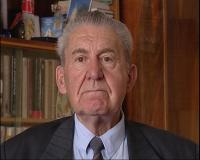“A man couldn’t even believe that Slovaks had a relationship in which they acted one against another.”

Stáhnout obrázek
Martin Hritz was born in 1923 in Levoča. He grew up in the family of manual workers and though he inclined to technology, since 1940 he had worked as a clerk at various places. After the liberation of Levoča he continued working as a clerk at the Local National Committee (MNV) and since the year 1949 he had been watched by the State Security not only at work, but also in his privacy. As he had reservations about how priests and nuns were treated at that time, he openly expressed his disagreement with the Catholic Action. Later he tried to help the group of priests by issuing them counterfeit identity cards. On December 14, 1950, he was accused of anti-state activities and taken into custody; he was also excluded from the Communist Party of Slovakia (KSS). Following the interrogation and torture, on July 4, 1951, on the main trial, he was found guilty of offences of high treason and espionage and subsequently he was sentenced to 15 years of imprisonment. He served his sentence in Leopoldov prison where they usually employed him and other prisoners in various works. Based on the decision of the Regional Court in Nitra, 7 years after passing the judgement, on May 29, 1958, he was finally paroled. After being released from the prison he got into many troubles because of his past, for example when he tried to find a job.

